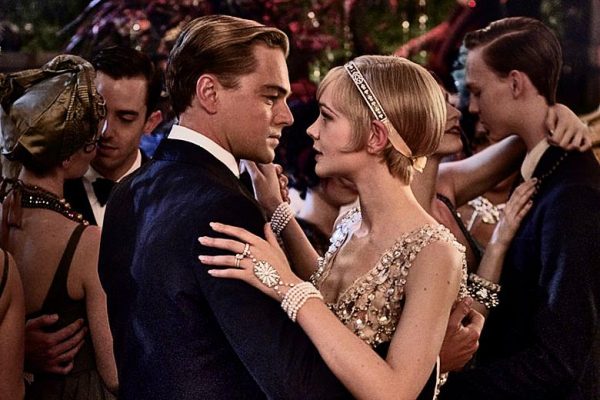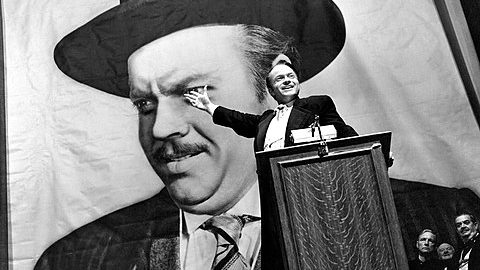Both Charles Foster Kane from the 1941 film Citizen Kane and Jay Gatsby from the novel The Great Gatsby by F. Scott Fitzgerald are complex characters whose striving for greatness, class, wealth, and power captures something unique about the American dream.
At the same time, those measurable outcomes are not the goal of their striving; they strive for something more. This material success is how they attain it. But in both cases, they’re unsuccessful, which serves to demonstrate the irony or elusive nature of the American dream.
Citizen Kane follows the story of the media tycoon, Charles Foster Kane. After his death, the meaning of his last word, “Rosebud” is fixed upon, to be deciphered. The film covers Kane’s rise to power, marriage troubles, and his constant striving for success.
During a flashback, we discover Kane’s mother earned a fortune for sending her son away to live with a banker. His parents sent him in the hopes that he would become a successful American businessman, thereby receiving a better life. Kane grows up to be an egotistical and arrogant man. These personality traits stem from his abandonment as a child.
Kane wants control over public perception and his legacy, all in an attempt to fill the empty hole in his life, which he believes is the reason he was abandoned. His overcompensation and need for validation and reassurance is a way to combat his inferiority complex.
Initially, he rises to power from his newspaper, The Inquirer. He wants total honesty in the newspaper. His pursuit of influence, in turn, creates a strong public image for himself. Later, Kane’s whimsical marriage to Emily Norton, the niece of the president, symbolizes his entry into higher society. From Emily, Kane seeks love and validation. Ultimately, however, she and Kane separate after Emily discovers Kane’s mistress.
His second marriage to his former mistress, Susan Alexander, also ends in failure, proving Kane’s inability to find happiness and to forge genuine connections. This loneliness is cleverly shown through intentional camera techniques by Director Orson Welles.
The scene begins silently, with Kane’s anger slowly building up. Welles employs low angles to convey Kane’s dominance. He throws suitcases, flips tables, smashes lamps, all in a violent and stiff manner that demonstrates his old age.
At one point during this scene, there is a long shot of Kane moving across the room with the camera displaying the destruction he has created, mirroring his crumbling life. As Kane walks through his mostly empty castle of a mansion, Welles employs expansive wide shots to convey Kane’s sense of loneliness and emptiness.
In the end, the film’s mysterious answer to Kane’s story arc is “Rosebud,” a childhood sled embodying a simpler and happier time in Kane’s life filled with love, long before he was sent away and abandoned by his loved ones. Despite his wealth and power, Kane longs for the simplicity of his childhood. “Rosebud” represents Kane’s unattainable dreams, further reinforcing his ultimately empty life.

Likewise, Fitzgerald’s novel The Great Gatsby follows the life of Jay Gatsby, a romantic idealist who uses illegal businesses to make money in order to attain a higher social class so that he can regain his previous lover, Daisy Buchanan. Gatsby believes that if he fits into Daisy’s world, then he will be worthy of her love and attain something he had from the past. Gatsby’s pursuit is corrupt and ultimately tragic.
No matter his wealth, his presence in high society, or the intensity of his hope, Gatsby cannot restore or return to that simpler time when he first met and fell in love with Daisy.
The storyline highlights the failed American dream and exposes how nostalgia clouds our understanding, blinding us to the reality that we cannot turn back the time. Even with all the power and wealth Gatsby has, he will never be able to create his idealistic past.
Both storylines, with characters motivated and reaching for vastly different goals, demonstrate that the American Dream is an elusive idea, searching for something beyond wealth or power — a want to gain true happiness and satisfaction.
For both characters, Charles Foster Kane and Jay Gatsby, the realization of the dream is impossible, with their true dreams just out of reach.




